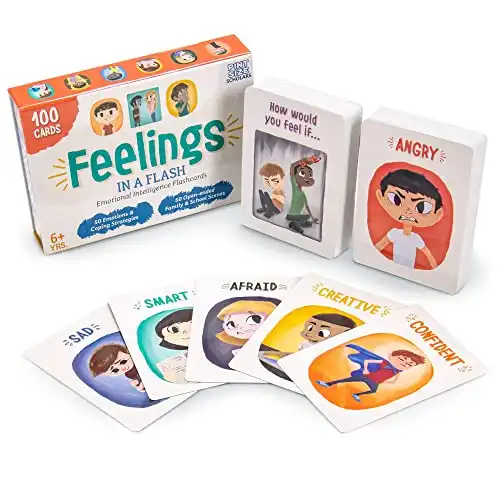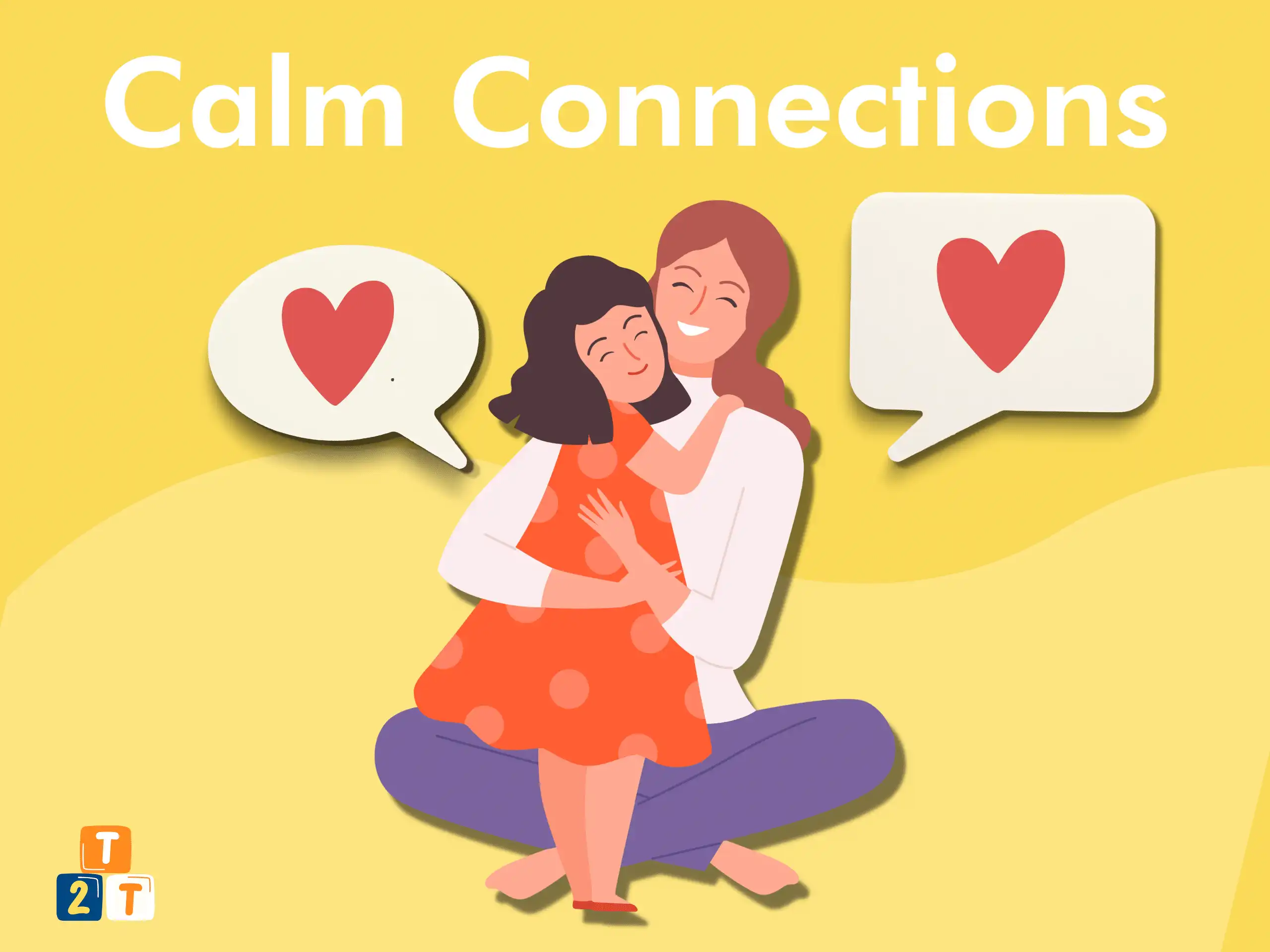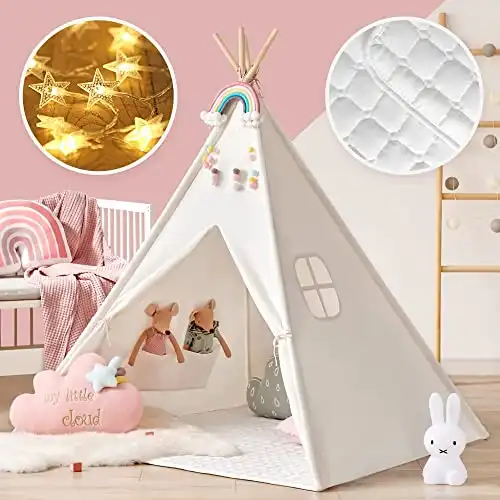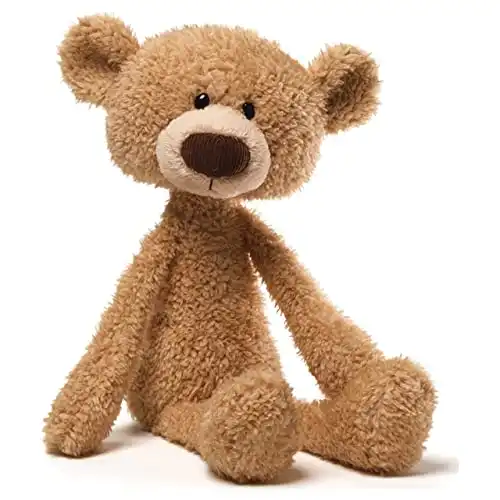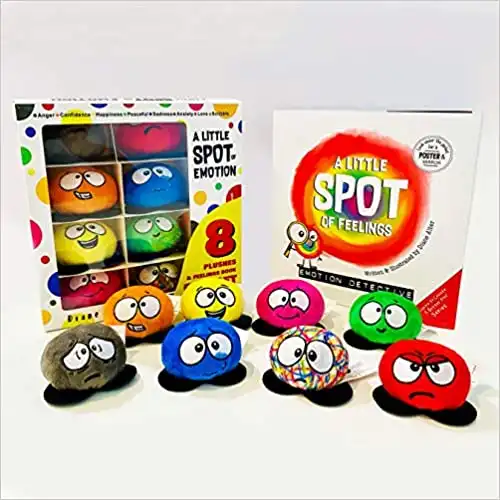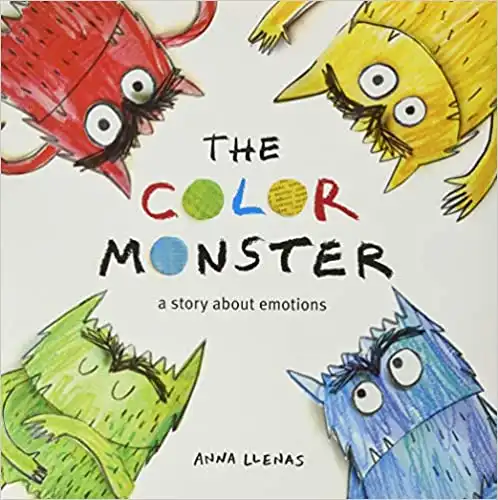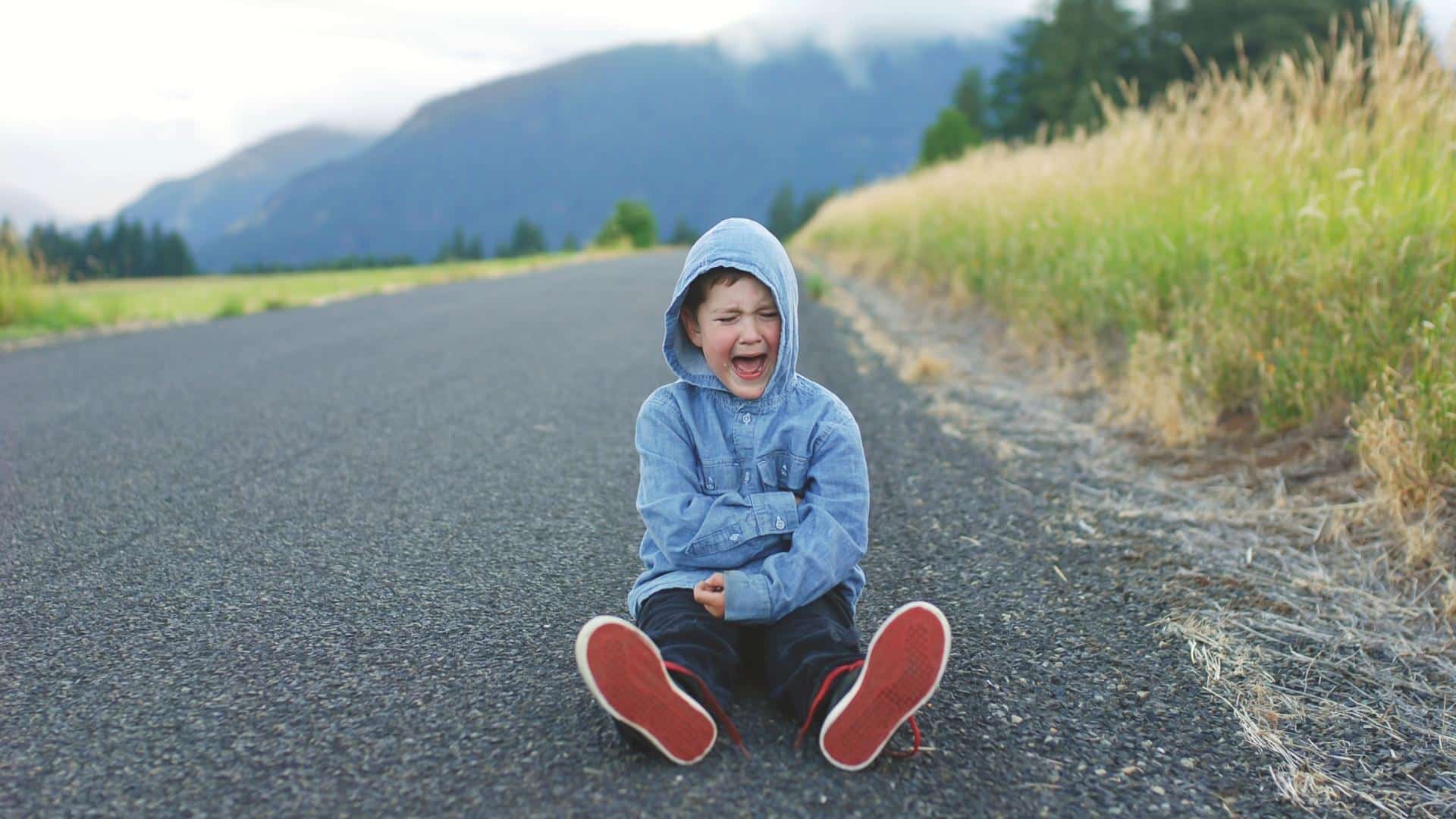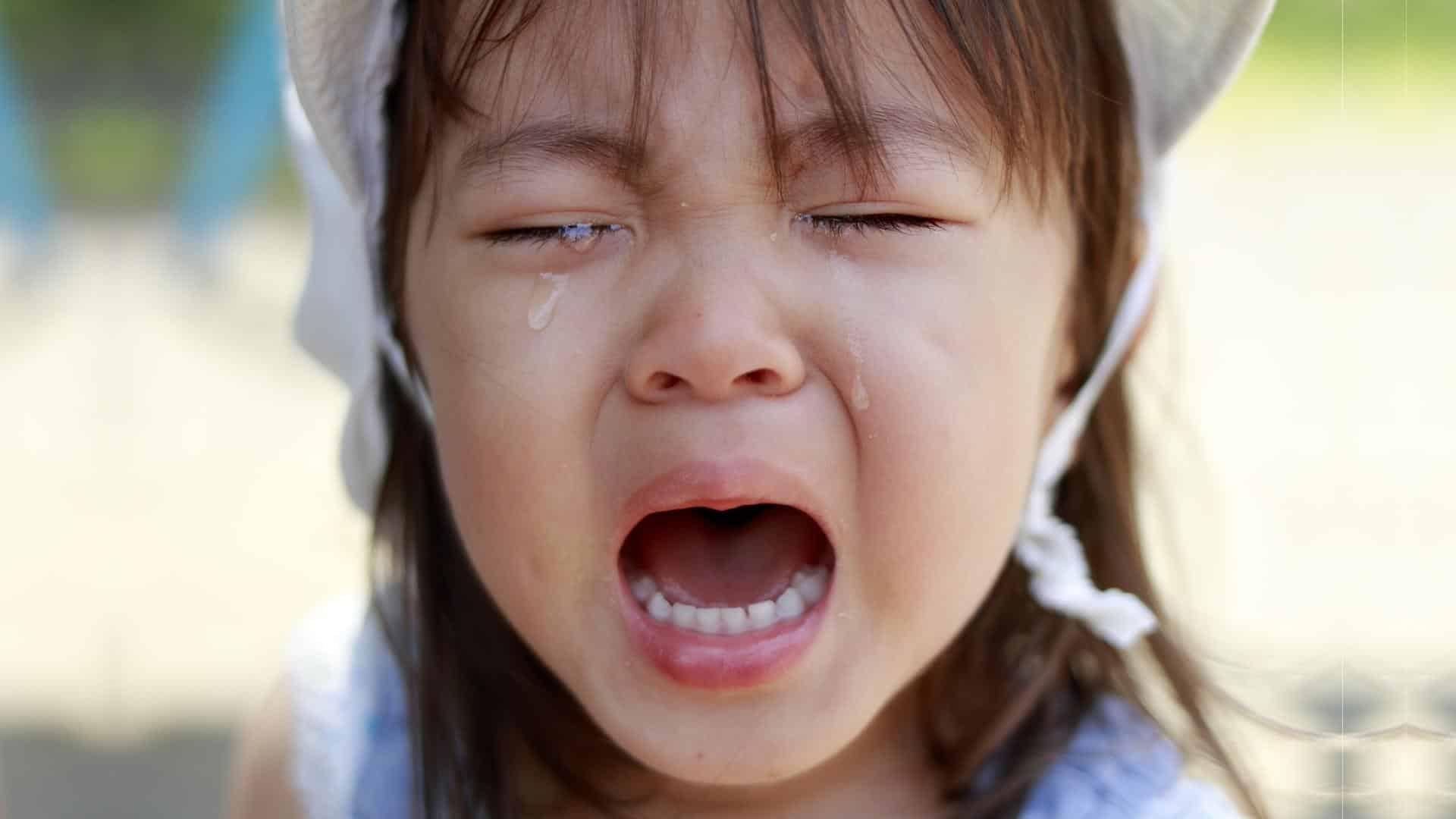Parents, have you ever found yourself in a public place with your 3-year-old throwing a full-blown tantrum? The screaming, kicking, and crying can be overwhelming, leaving you feeling embarrassed and helpless.
But why do tantrums in 3 year olds occur, and how can you prevent them from happening again? Join us as we dive into the world of 3-year-old tantrums, explore the reasons behind them, and share some practical tips to help you manage them.

Table of Contents
What Is A Tantrum?
A tantrum is an eruption of emotion often born out of frustration or anger. They can result in your 3 year old kicking, screaming, hitting or biting to let out their frustrations and try to get what they want. They may also throw things and hold their breath for extended periods of time in protest.
Are Tantrums In 3 Year Olds Normal?
Yes, tantrums in 3 year olds are completely normal toddler behavior. Children of this age are bursting with big emotions and an ever-increasing desire for independence.
Their frustration and inability to communicate what they want, how to express themselves and how to control their emotions will often result in 3 year old tantrums.
REMEMBER: Healthy children of all ages are capable of having a tantrum… but if tantrum-like behaviour is not handled properly, then their disruptive behaviours can continue for years to come.
How To Handle Tantrums In 3 Year Olds
Most tantrums in 3 year olds are a result of frustration and the desire for independence but the lack of ability to self-regulate these emotions or communicate their wants and desires adequately or appropriately will have a big impact too.
Being prepared and having a list of strategies to deal with tantrums in 3 year olds is your best plan to get through them safely and effectively.
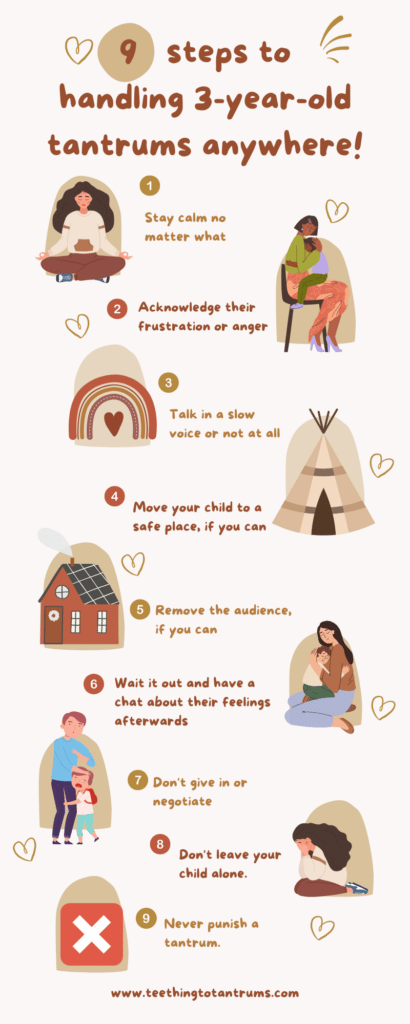
1. Stay calm no matter what. This is the hardest part of handling tantrums in 3 year olds. But taking a deep breath and staying calm is key to preventing a tantrum from escalating.
2. Acknowledge their frustration and anger. Toddler tantrums usually occur when your little one feels ignored, unheard or misunderstood. So acknowledge their anger or frustration with minimal words or some helpful emotion flashcards.
3. Talk in a slow low voice or not at all. Use as few words as possible. Mid – tantrum, 3 year olds are looking for you to lose your temper and give them a reaction. Sometimes it is best not to say anything until the tantrum has passed.
4. Move your child to a safe place, if possible. If you can, move to a safe place where your child cannot hurt themselves, you, anyone or anything else.
5. Remove the audience, if possible. It can feel very embarrassing to have your child throw a tantrum in public so if you can, remove them from an audience. This allows you to concentrate on them without worrying about what others are thinking and very often, without people around your little one’s tantrum will lose momentum.
6. Wait it out and chat about their feelings afterwards. You cannot force a tantrum to come to an end. Nor can you expect your toddler to listen to you in the middle of a tantrum. Therefore, wait it out and sit down and have a chat about what happened afterwards. Talk about why it happened and help your 3 year old understand that there are more acceptable ways to express their feelings next time.
7. Don’t give in or negotiate. And I mean NEVER give in to a tantrum. Even if part way through you feel you may have denied them something that they could have had or done…Once you have said ‘no’ you must see it through. If you give in to a tantrum you reinforce that this behavior gets results.
8. Do not leave them alone. While you may be tempted to walk away… do not leave your tantrum throwing 3 year old alone.
9. Never punish a tantrum. Punishing a tantrum will not stop them from happening again. Instead, talk about the incident afterwards and how better to handle extreme emotions in the future.
Want to stop your children from yelling, shouting & throwing tantrums... Whilst helping them listen to you and building a healthy strong relationship? Look no further than Calm Connections and transform your family’s life for years to come.
- Understand the best way to communicate with your child in different situations, so you feel more confident, relaxed, and in control... even during the most challenging moments. 💖
- Learn how to set clear boundaries and engage your child's cooperation 🌟
- Break free from tantrum cycles and promote healthy alternatives (without using punishment) 🎉
- Learn my trade secrets (collected over 40+ years in the childcare industry) to get your child to listen to you without shouting 🙌
- Promote kindness and honesty to prioritize a respectful relationship with your child ❤️
How To Prevent Tantrums In 3 Year Olds From Happening
Prevention is always better than reaction. And having some tricks up your sleeve to prevent toddler temper tantrums from happening in the first place is hugely beneficial for the whole family.
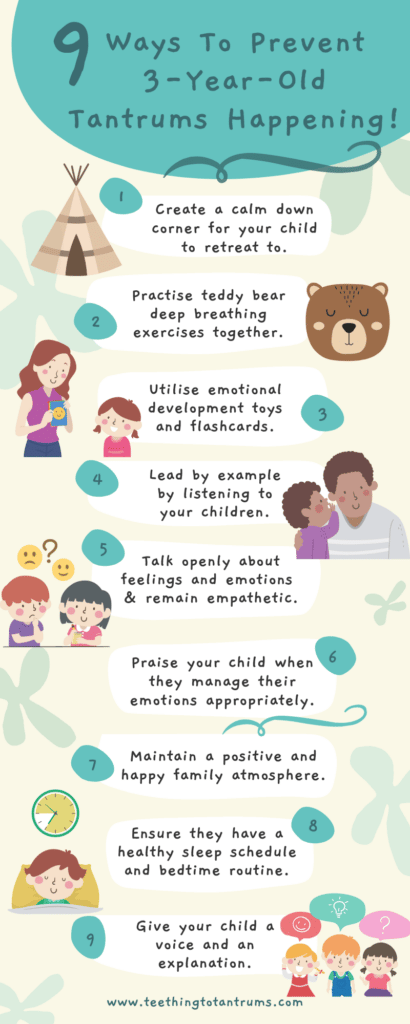
1. Create a calm-down corner. Having a safe space where your 3 year old can go when they feel things are getting too much can be hugely beneficial to help them reset their emotions. Having a canvas tent, filled with cushions and a few cuddly toys is great place to start.
All children love a little house and a teepee is a versatile set up that you can use both indoors and out. This is an item tha will grow with your child's imagination and provide hours of fun for you and them. The perfect setting for nursery tea parties and a cosy snuggle spot for hanging out and reading together or alone.
2. Practice teddy bear breathing. This is a fun way to get your little one to practice deep breathing. Balance a teddy bear on their tummy and give it a ride with the rising and falling of your child’s breath. It is a great idea to make this part of the bedtime routine when they are lying down in bed.
Super soft, very cuddly and the perfect companion to young children, the GUND Teddy Bears never fail to be toy box favourites for years to come!
3. Utilise emotional development toys, books and flashcards. These are excellent ways to get your little one to talk about their emotions in a healthy way. They will give you an insight into how your child is feeling and will give them the essential verbal tools to express themselves in a healthy way.
4. Lead by example by modelling good listening. Leading by example and listening to your child first will go a long way in avoiding unnecessary future tantrums.
5. Always remain empathetic to their emotions. Your child needs to know that what they are feeling is not bad but perfectly normal and that we all struggle with strong feelings. Encouraging and helping your 3 year old process these emotions is what is most important and they will need your constant patience, understanding and support as they learn how to handle strong emotions. I love the Little Spot of Emotion Books to help address this topic with children.
What is it? This book contains 8 different plush toys each displaying a different emotion - Anger, Anxiety, Peaceful, Sadness, Happiness, Love, Confidence and Tangled (Scribble) - to help children identify and process their emotions.
Why do I like it? This is a very helpful tool to teach children about emotions and how to handle them. Its fun plush toys make learning about emotions manageable and approachable. The Little SPOT of Emotion book is also ideal for children with social-emotional needs.
6. Praise your child when they manage their emotions properly. When your child successfully processes or navigates a situation that could have resulted in a tantrum ensure that you give them plenty of praise and encouragement. Reinforcing a good outcome will definitely help to reduce tantrums moving forward.
7. Maintain a happy and positive family atmosphere. 3 year olds are very sensitive to their environment. Positive attention and eliminating common triggers will ensure happier and calmer surroundings… resulting in fewer tantrums.
8. Ensure your child has a healthy age-appropriate sleep schedule and regular bedtime routine. Sleep and emotional behavior go hand-in-hand. Help your child to maintain a consistent sleep schedule and bedtime to limit the possibility of overtiredness causing any tantrums.
9. Give your child the words to express their feelings. Very often severe tantrums are a result of your child’s inability to vocalise how they are feeling. Make sure there are plenty of opportunities for your 3 year old to talk about their emotions and give them the words to express themselves.
NOTE: If you wish to leave your child to calm down by themselves for a short time, the American Academy of Pediatrics recommends a 1-minute “time out” for every year of your child’s age.
Looking to get your little one to sleep quickly and effortlessly? Check out my Bedtime and Nap Cheat Sheet and master the art of making daytime naps and bedtimes as seamless as possible.
A bedtime & nap cheat sheet so good your little one will ask you to put them to bed...
Laura Williams "This is a life saver! I'm so glad I downloaded your bedtime & nap cheat sheet. My little one actually asked me to put him to bed last night! Unbelievable! Thank you so much!"
Click Here For The FREE Cheat Sheet
Why Is My 3 Year Old Suddenly Having Tantrums?
There are lots of triggers for tantrums in 3 year olds. If your little one is suddenly having tantrums check to see if they are feeling any of the following:
1. They are tired. 3 year olds will often throw frequent tantrums if they get overtired. It is very easy for this to happen especially if they have started nursery school or are fighting their afternoon rest time.
2. They are hungry. It is important that your 3 year old gets three regular meals a day supplemented by healthy snacks if necessary to avoid them becoming hangry.
3. They are frustrated. If your 3 year old is not developing appropriate self-regulating skills or does not have adequate language skills to express what they want, they may become aggressive and frustrated leading to a full-blown tantrum.
4. They are trying to cope with a new big event. Many 3 year olds will struggle with a big life event such as the arrival of a new sibling, moving house, starting nursery school or moving from a cot to a bed. Any of these events can trigger an increase in tantrums as they navigate new emotions and situations.
TOP TIP: Your approach to tantrums should be both about teaching your child preventative self-regulation skills as well as understanding how to stop them from happening.
Is Attention Deficit Hyperactivity Disorder To Blame?
You will only know if attention deficit hyperactivity disorder (ADHD) is contributing to tantrums in your 3 year old if you consult a child psychologist or child development expert.
What Is The Difference Between A Tantrum And A Meltdown?
The main difference between tantrums in 3 year olds and meltdowns is that:
- A tantrum is a result of frustration or anger, where your child will still have some element of control over their behavior and the tantrum will usually end once they have got what they want.
- And a meltdown is a result of emotional or sensory overload, where your child will struggle to calm down and will only do so once they have been removed from the situation that caused the meltdown in the first place.
However, some tantrums can turn into meltdowns if they go on for a long time…
Characteristics Of A Tantrum:
- Tantrums in 3 year olds are goal-driven
- Your child will remain partially verbal and communicative
- They are a normal reaction to feeling frustrated, angry or not getting their own way
- They are driven by a desire for attention or a result of not being able to fully communicate what your child wants
- They remain under the child’s control
- Children will watch to see what your reaction is
- Children will yell but be able to negotiate
- They will stop once your child’s goal has been achieved
- Your child can recover quickly once the tantrum is over
- Your child may show aggressive behaviors to get what they want
Characteristics Of A Meltdown:
- Meltdowns are not goal-driven
- Children are less verbal and communicative
- Meltdowns are an instinctive reaction to feeling overwhelmed or being unable to handle strong emotions such as fear, anxiety or sensory overload
- They are out of a child’s control or ability to reason
- They are usually long-lasting
- Meltdowns are often something children will not grow out of
- Children will not be able to process what is going on around them
- Children will not be able to negotiate with you
- They will struggle to calm down
- Children will often become withdrawn once a meltdown has ended
TOP TIP: If you suspect that your 3 year old is experiencing meltdowns instead of tantrums, click here to get specific advice on how to handle emotional meltdowns in young children.
Frequently Asked Questions About Tantrums In 3 Year Olds
Need more advice about tantrums in 3 year olds? Get the answers to the most common questions here:
How Long Do Tantrums In 3 Year Olds Last?
A toddler tantrum can last anywhere from 30 seconds to 15 minutes.
If your little one is consistently having tantrums that last longer than this you should consult a medical practitioner to see if an emotional assessment would be appropriate.
How Do You Discipline A 3 Year Old Who Doesn’t Listen?
Toddlers are driven by intense curiosity and their desire to explore and understand the world is all-consuming. Therefore, they do not think ahead and often try to do and want things that they cannot have.
This can lead to frustration, anger and unwanted behaviors, such as tantrums and refusal to listen.
Effective discipline and enforcing boundaries will ensure your toddler knows exactly what is expected of them and where they stand within certain situations to learn how to appropriately react next time.
To learn how to appropriately discipline a 3 year old who won’t listen, read this post.
Should You Ignore A Child Having A Tantrum?
Yes and no. Yes, you should try and avoid conversation while your 3 year old is having a tantrum… But you should never leave them fully alone.
TOP TIP: Sit down on the floor nearby and read a magazine or check your messages on your phone while your little one is having a tantrum (while keeping an eye on what they are doing, of course). This gives a clear message that you are totally unbothered by what they are doing and can often bring a tantrum to an end very quickly.
Do 3 Year Old Have Tantrums On Purpose?
Most 3 year olds do NOT have tantrums on purpose. By 3 years of age, your toddler will know the difference between right and wrong but will still struggle to handle strong emotions at times.
Dealing with our emotions is a lifelong lesson. Your 3 year old is at the start of this journey. Sometimes they will get it right and sometimes they will not…
However, if you give in to tantrums and your 3 year old learns that they work… then the tantrum-like behavior will become a habit.
What Do You Do When Your 3 Year Old Screams At You?
Firstly, don’t ever scream back or verbally discipline your toddler when they’re throwing a tantrum. They are screaming at you to get a reaction… so the most powerful weapon you have is not to react.
Keep your voice calm and refuse to talk about the issue until they bring down the volume and use their ‘quiet’ voice. Encourage them to come and sit in the calm-down corner where you can help them express their feelings in an acceptable manner with positive behavior.
It is important that you take this time once the screaming has stopped to reinforce that they will have your attention if they speak and behave respectfully.
When To Seek Help For Tantrums In 3 Year Old
In some cases, temper tantrums in 3 year olds can be an indication of an underlying condition linked to the child not being able to process emotions effectively.
If you notice any of the following signs, or if your child is regularly engaging in specific types of tantrum behaviors, then I would advise having a chat with a behavioral pediatrician or developmental pediatrician to see if an emotional assessment would be useful:
- Tantrums happen more often, are getting worse and last longer.
- Your child struggles to calm down after an outburst
- Tantrums regularly last longer than 15 minutes.
- Your child tries to hurt themself or others.
- Your child always opposes you, argues a lot and hardly ever cooperates with you even when given acceptable choices.
Further Reading
- Tantrums In 2 Year Olds
- Tantrums In 3 Year Olds
- Tantrums In 4 Year Olds
- Tantrums In 5 Year Olds

A bedtime & nap cheat sheet so good your little one will ask you to put them to bed...
Laura Williams "This is a life saver! I'm so glad I downloaded your bedtime & nap cheat sheet. My little one actually asked me to put him to bed last night! Unbelievable! Thank you so much!"
Click Here For The FREE Cheat Sheet
